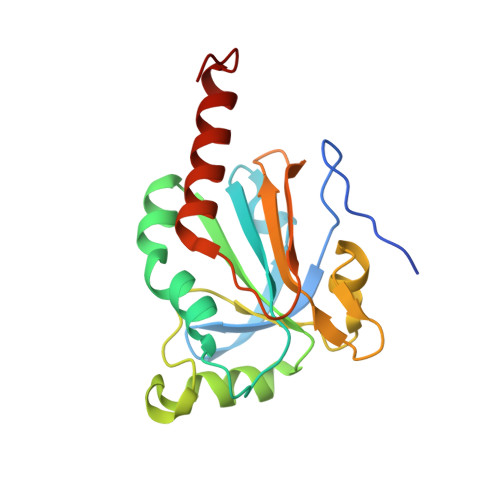Peroxiredoxin-1 from the Human Hookworm Ancylostoma ceylanicum Forms a Stable Oxidized Decamer and Is Covalently Inhibited by Conoidin A.
Nguyen, J.B., Pool, C.D., Wong, C.Y., Treger, R.S., Williams, D.L., Cappello, M., Lea, W.A., Simeonov, A., Vermeire, J.J., Modis, Y.(2013) Chem Biol 20: 991-1001
- PubMed: 23891152
- DOI: https://doi.org/10.1016/j.chembiol.2013.06.011
- Primary Citation of Related Structures:
4FH8, 4KW6 - PubMed Abstract:
Hookworms are parasitic nematodes that have a devastating impact on global health, particularly in developing countries. We report a biochemical and structural analysis of a peroxiredoxin from the hookworm Ancylostoma ceylanicum, AcePrx-1. Peroxiredoxins provide antioxidant protection and act as signaling molecules and chaperones. AcePrx-1 is expressed in adult hookworms and can be inactivated by 2,3-bis(bromomethyl)quinoxaline-1,4-dioxide (conoidin A). Conoidin A inactivates AcePrx-1 by alkylating or crosslinking the catalytic cysteines, while maintaining the enzyme in the "locally unfolded" conformation. Irreversible oxidation of the resolving cysteine may contribute additional inhibitory activity. A crystal structure of oxidized AcePrx-1 reveals a disulfide-linked decamer. A helix macrodipole near the active site increases the reactivity of the catalytic cysteines to conoidin A. This work demonstrates the promise of conoidin compounds as probes to evaluate peroxiredoxins as drug targets in human parasites.
Organizational Affiliation:
Department of Molecular Biophysics and Biochemistry, Yale University, New Haven, CT 06520, USA.















